Archive for June, 2015
New from the archive
11 June 2015 | This 'n' that
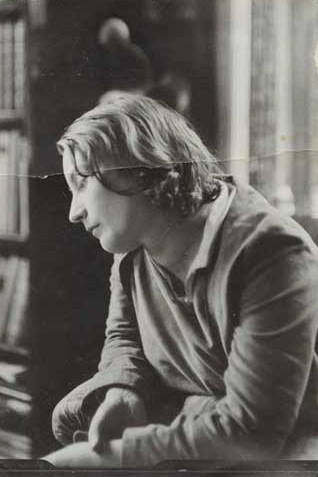
Helvi Hämäläinen. Photo: Literary Archives of the Finnish Literature Society.
This week, an excerpt from Helvi Hämäläinen’s gorgeously sensuous novel Säädyllinen murhenäytelmä (‘A respectable tragedy’,1941)
Right at the top of the list of untranslated Finnish masterpieces, for me, is Helvi Hämäläinen’s monumental Säädyllinen murhenäytelmä.
Written in the fateful summer of 1939, as the world waited for war, this story of love among the Helsinki intelligentsia is at the same time both a roman a clef – it caused a sensation on publication as the real people behind the fictional characters were recognised – and a vivid picture of its age. The falling cadences of its luxuriantly proliferating phrases offer a voluptuously aesthetic poetry of the senses as they slowly tell the story of love lost and then, gradually, regained. And the book answers the question, what was it like to be alive then?, with incomparable vividness. In this extract, the novelty of apartment living in the 1930s, the colours and smells, the new social habits, are all brought to life with extraordinary intensity.
We also republish a selection of poems published much later in Hämäläinen’s life, many of them impassioned elegies for the lives lost in the Second World War, giving voice to the sheer weight of sorrow, of grief for those who were lost.
If you’d like to read more, Soila Lehtonen’s evocative essay on Säädyllinen murhenäytelmä accompanies another excerpt; while a glimpse of its sequel, Kadotettu puutarha, (‘The lost garden’, 1995), follows the story onward to an elegiac description of the parts of Karelia that were ceded to the Soviet Union in the Second World War.
![]()
The Books from Finland digitisation project continues, with a total of 396 articles and book excerpts made available on our website so far. Each week, we bring a newly digitised text to your attention.
New from the archive
8 June 2015 | This 'n' that
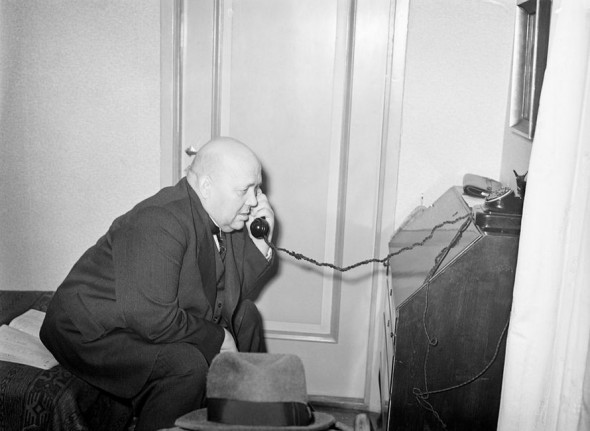
F.E. Sillanpää in his home receives the news that he has been awarded with the Nobel prize in literature in 1939.
This week, a short story from Finland’s one and only Nobel laureate, F.E. Sillanpää
Time has largely forgotten Frans Emil Sillanpää (1888-1964), but in the interwar years of the last century this complex writer – biologist, realist, mystic and proponent of ‘life-worship’ – was one of the most prominent in Finland. His work, intriguingly archaic and modern at the same time, is well represented by Järvi (‘The lake’, 1915), the short story we publish here.
Finland’s only Nobel Prize for Literature was awarded, perhaps not coincidentally, in the fateful year of 1939, and when Sillanpää travelled to Stockholm to receive his award, the Soviet Union had already attacked Finland. After the award ceremony, Sillanpää stayed in Sweden to raise funds for his beleaguered country.
![]()
The Books from Finland digitisation project continues, with a total of 393 articles and book extracts made available on our website so far. Each week, we bring a newly digitised text to your attention.
Leena Krohn: Erehdys [‘The mistake’]
8 June 2015 | Mini reviews, Reviews
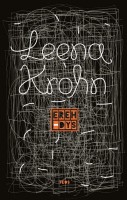 Leena Krohn
Leena Krohn
Erehdys [‘The mistake’]
Helsinki: Teos, 2015. 154 pp.
ISBN 978-951-851-575-6
€24.00, hardback
The protagonist of this new novel by Leena Krohn (born 1947) is an elderly author, E., who one dark and cold winter night arrives by car in a small town to perform in a literary event at a local library. The atmosphere does not seem very welcoming, and as the author begins reading extracts from his works, the comments and questions from the audience are mostly negative and impolite, even hostile. Gradually the sinisterness of the whole event becomes tragicomic; on leaving, the author has to fight his feelings of self-pity and anger. This novel frames E’s life in a portrait of a serious soul in constant pursuit of comprehending life – which he finally seems to acquire in death (in a car accident). The larger part of the novel consists of the stories the author reads; they will be familiar in style to fans of Krohn’s work. Unexpected, strange and unexplicable events and moments of everyday life take the characters by surprise; dreams, memories, remembering and forgetting what has taken place in the history – imagined or real – may perhaps change the way they have lived their lives.
Intelligent living
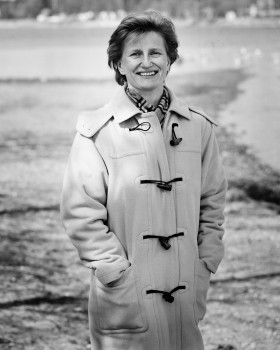
Minna Lindgren. Photo: Ville Palonen.
In Ehtoolehdon tuho [‘The decline of Twilight Grove’, Teos, 2015), the final novel in a trilogy about life in an assisted living home, employing human staff has become too expensive and the old folk are part of a pilot project in which they are cared for by electronic devices, monitors, cameras, ‘smartwalls’ and cleaning robots: ‘there was intelligence everywhere, masses of it, just a hiccup and something terribly intelligent would happen.’
The aged lady residents don’t like their new life, but they’re resilient; they’re not about to let the new technology defeat them…
Minna Lindgren’s mordantly satirical, often hilariously funny writing has earned her a wide readership. Translations of the trilogy are soon to appear in English, German and French.
![]()
An excerpt from Ehtoolehdon tuho [‘The decline of Twilight Grove’, Teos, 2015). Review by Soila Lehtonen
‘You’re 97 today! Your wakeup call service today congratulates!’
As if she wouldn’t have remembered. Ninety-seven was almost a hundred. She and Irma had decided that they would refuse to turn one hundred. It would only make trouble. One lady, in the bottom apartment of the A staircase, had received an invitation to the health centre on her birthday. Apparently all five-year-olds were called in for monitoring of their motor and psychological development, and when this lady turned 105, the computer system thought she was a toddler. The computer didn’t recognise numbers over one hundred. Siiri thought the lady should have kept the appointment; she would have done, for the tests were fun. You had to draw a triangle and walk along a straight line. Not that easy for someone of 105. But the lady didn’t go, she just made a terrible fuss about it and complained to everyone, until she died before her complaints reached the right official. More…
Oldest Helsinki photograph
2 June 2015 | This 'n' that
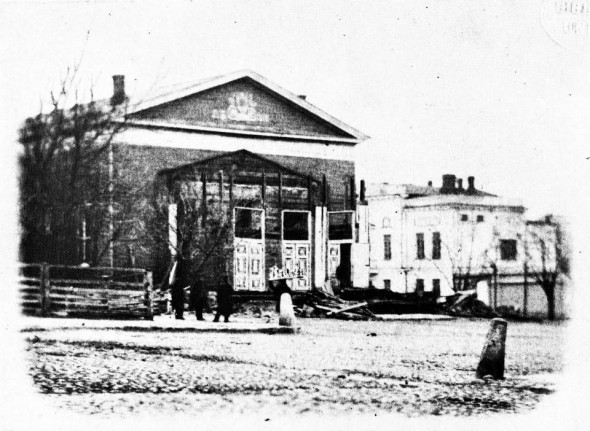
Old Helsinki: this image, taken in the Esplanadi park more than 150 years ago, shows the old theatre building, which was demolished in the 1850s. Photo: Helsinki City Museum / CC BY-ND 4.0.
Hidden in plain sight in Sven Hirn’s Kameran edestä ja takaa – valokuvaus ja valokuvaajat Suomessa 1839-1870 (‘Behind the camera and in front of it – photographs and photographers in Finland 1839-1870’), published more than 40 years ago, the image shows four men standing in front to the theatre designed by Carl Ludvig Engel in 1827 (and demolished when it became too small to accommodate the city’s enthusiastic theatre-going public in the 1850s). Unusually, in those days of slow shutter speeds, the photograph shows people, among them Carl Robert Mannerheim, father of the Marshal Mannerheim who was to lead Finland’s defence forces in the Second World War (third from left).
Among the other photographs published by Helsingin Sanomat are some images of Helsinki decked out in garlands awaiting the arrival of Tsar Alexander II to the capital of his autonomous grand duchy of Finland in July 1863.
Other mid-century images show central Helsinki looking not unlike its present-day self. It’s only when the camera ventures outside the few blocks of the city centre that the view becomes more unfamiliar, the streets lined with one- and two-storey wooden houses.
Most intriguing of all, however is a sequence of eighteen photographs taken in 1866 by one Eugen Hoffers from the top of Helsinki Cathedral. Helsingin Sanomat has linked them into a panorama with views of Suomenlinna fortress, the new Russian Orthodox Uspenski Cathedral, Books from Finland’s old publisher Helsinki University Library, and the burgeoning city beyond.
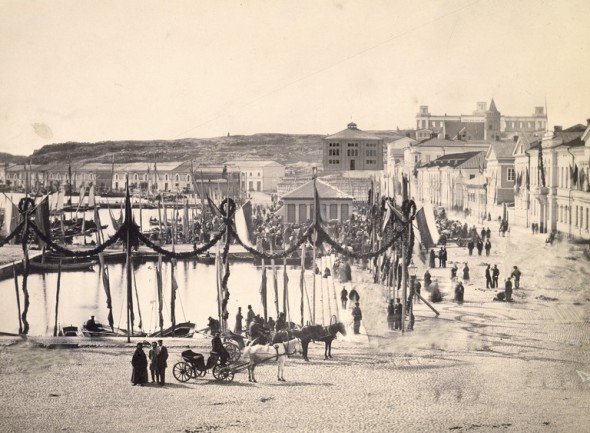
Imperial welcome: Helsinki is bedecked with flowers to welcome Tsar Alexander II on 28 July 1863. Photo: Helsinki City Museum / CC BY-ND 4.0.
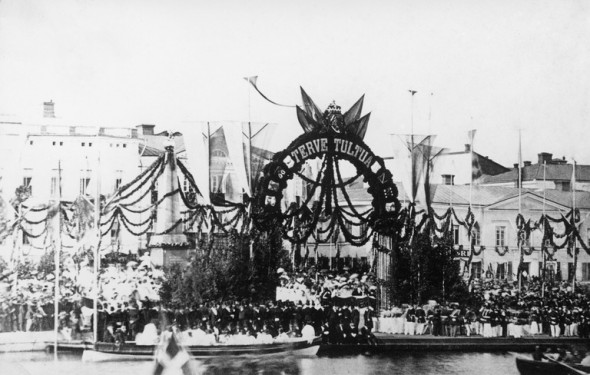
Pomp and circumstance: elaborate floral tributes for the visit of Tsar Alexander II in 1863. Photo: Helsinki City Museum / CC BY-ND 4.0.
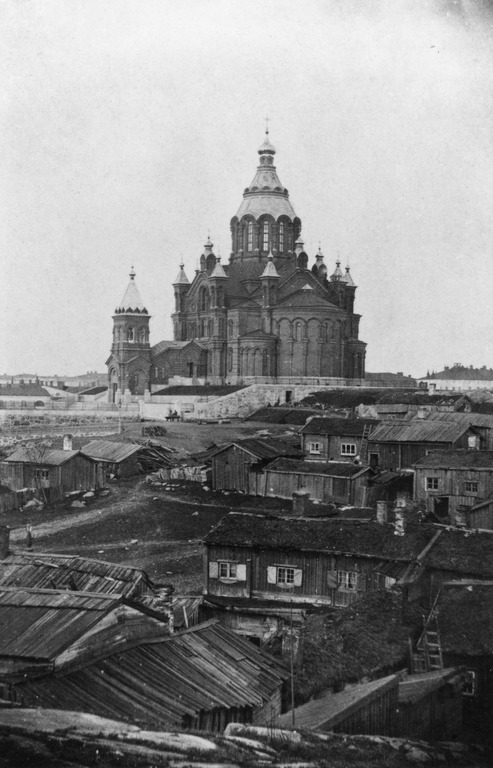
New and old: the recently completed Uspenski Cathedral is surrounded by a shanty-town of tumbledown cottages in this image from 1868. Photo: Hoffers Eugen, Helsinki City Museum / CC BY-ND 4.0.
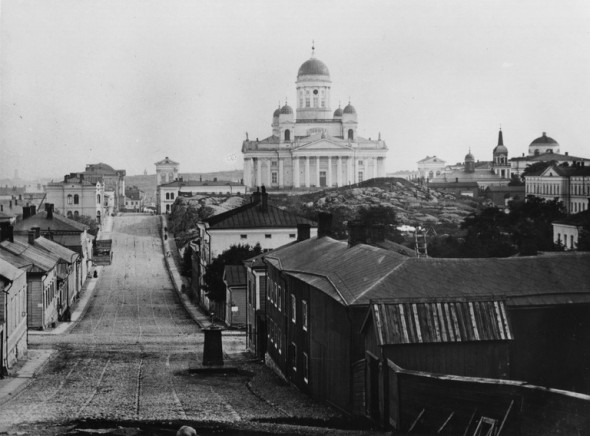
Strange and familiar: this picture, from 1865, shows the Cathedral, the Senate and the University Library surrounded by low wooden buildings and unbuilt land. Photo: Helsinki City Museum / CC BY-ND 4.0.
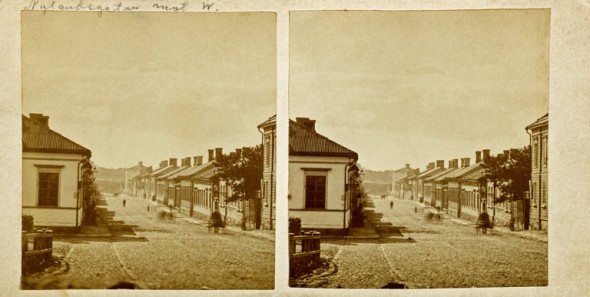
City of wood: beyond the familiar buildings of the few blocks of the then city centre, in this image from the 1860s, lie streets of modest one- and two-storey wooden houses. Photo: Gustaf Edvard Hultin , Helsinki City Museum / CC BY-ND 4.0.
Minna Lindgren: Ehtoolehdon tuho [The downfall of Twilight Grove]
1 June 2015 | Mini reviews, Reviews
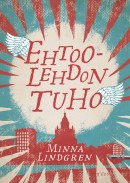 Minna Lindgren
Minna Lindgren
Ehtoolehdon tuho [The downfall of Twilight Grove]
Helsinki: Teos, 2015. 288pp.
ISBN 978-951-851-646-3
€29.90, paperback
This is the final novel in a trilogy by the writer and music editor Minna Lindgren (born 1963). The protagonists in Kuolema Ehtoolehdossa (‘Death in Twilight Grove’, 2013) were lively ninety-something ladies in an assisted living facility in Helsinki. Now their life is turning more and more satirically and grotesquely absurd: as employing human workforce is becoming too expensive for the owners of the facility, the old folks are being cared for by electronic devices, monitors, cameras, ’smartwalls’ and cleaning robots, and their food – tasteless but colourful paste – is dispensed from 3D vending machines. In addition to all this, the members of a devious religious group, in pursuit of any money that the inhabitants may still have, begin to manipulate them. Things are not looking good, but the resourceful ladies are not about to give in, even though one of them will peacefully – and considering her age, naturally – pass away (in her bed, holding her favourite book, Thomas Mann’s The Magic Mountain). Lindgren defends the human rights of her characters with gusto. No wonder, then, that the trilogy will shortly appear in several languages, including English, German and French.
